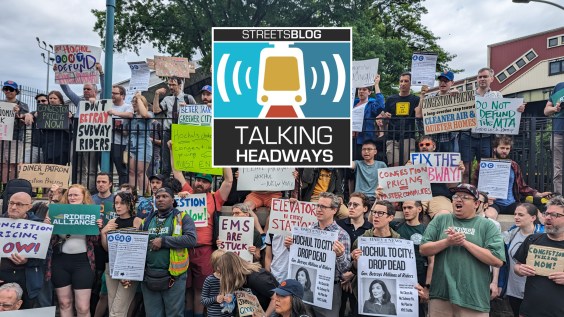 A simulation of a pedestrian and bicycle path on the Bay Bridge, from a 2001 Caltrans study
A simulation of a pedestrian and bicycle path on the Bay Bridge, from a 2001 Caltrans studyThe Bay Area Toll Authority (BATA), a division of the MTC, is expected to approve a $1.3 million contract with TY Lin International consulting to prepare a Project Study Report (PSR) that would analyze the feasibility of adding two pedestrian and bicycle paths on the west span of the Bay Bridge (PDF). TY Lin is already a contractor on the new east span of the Bay Bridge being constructed between Yerba Buena Island and Oakland.
The PSR will build on the massive feasibility study completed for Caltrans in 2001 that analyzes various options for construction of the path, which was projected to cost between $160-390 million in 2001 dollars. The cheaper estimate would cover just a path, while the higher cost would include simultaneously replacing the roadway structure.
By funding a PSR study, BATA staff is making an important
administrative decision that will move the path one step closer to
realization, shifting it into a category of projects that could be built should funding become available, a move that caught some bicycle advocates off guard.
"Maybe they felt sorry for us sitting there with our big pleading eyes, fifteen years down the line with nothing to show for it," said Andy Thornley, SFBC's Program Director, with a smile. "Because staff initiated this and because they don't need to find new money to fund the PSR, we think it will go through."
Thornley also noted that any further delay could spell trouble for the path touchdown locations. With development around the bridge, one of the touchdowns from the 2001 study is already impossible.
 A simulation of one of the touchdown ramps
A simulation of one of the touchdown rampsThornley said that Supervisor Chris Daly, Vice Chair of BATA, was supportive of the proposal before his committee. The path would connect Treasure Island with downtown, both of which are in Daly's supervisorial district.
The new east span of the bridge, set to be completed by 2011, includes a bicycle and pedestrian path, though cyclists and advocates have complained that without constructing a path on the west span, the new east-span path will end at Yerba Buena and Treasure Islands, thus serving no transportation function for commuters.
"I think that if that path is built it will be one of the most popular walking and bicycling paths in the country overnight, and it will save Caltans money on maintenance because they will be able to stage maintenance vehicles on part of the path during the day," said Dave Snyder, Transportation Policy Director for SPUR.
Snyder said the PSR is important because it allows the proposal to finally be measured against other projects in the pipeline, but warned that scarce funding will make it a challenge to realize the project.
"The PSR is great because it gets the project initiated, but it will be an interesting conversation when it comes to funding," he said. "This will be competing with a lot of important transportation projects out there."








